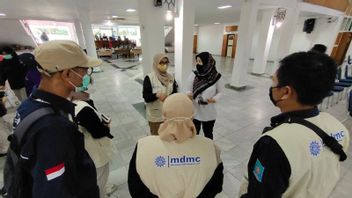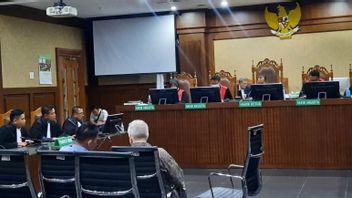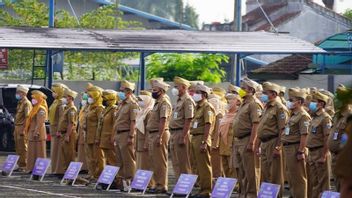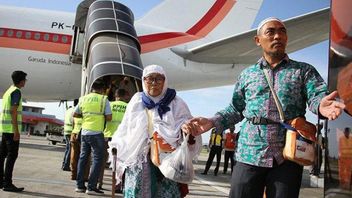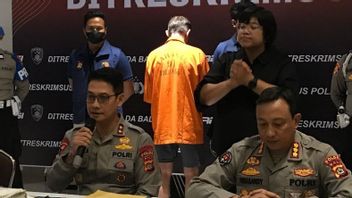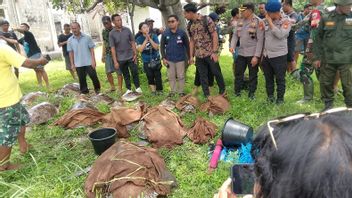
JAKARTA - The Myanmar military regime is intensifying its inspection of civilians' cellphones, to check their ties to the civil disobedience movement (CDM) and other matters related to the rejection of the February 1 coup.
"They saw my photo gallery. They read my messages. And they checked my Facebook Messenger account. Then they asked if I was involved in the protests. They wanted to know which side I support in politics," said Nandar, not his real name, a woman from Mandalay who recounted his experience of having his cellphone checked by security forces, citing Myanmar Now Sunday, July 18.
Luckily, he's already taken precautions to delete the incriminating photo or message. With the slightest photo or suspicious message related to the demonstration, it is certain that Nandar will soon be behind bars.
According to the Assistance Association for Political Prisoners (AAPP), an exile-based advocacy group, the regime is targeting Myanmar citizens' cellphones as a means of resisting the coup and the military regime.
The AAPP, which says at least 5,100 people are still being held in the country's prisons for opposing the February 1 military takeover, called the current situation the worst in Myanmar's long history of repression.

"Never in the past has it been as bad as it is now," said a spokesman for the group, who asked not to be named because he feared for his family's safety.
The military's goal, he said, was to instill fear in everyone by violating their privacy at every level, whether by raiding their homes or confiscating their cell phones.
Nandar said, most residents are now reducing their uploads on Facebook and other social media. Meanwhile, some other residents choose to create new accounts that make them less easily detected. Residents are now avoiding major roads so as not to meet the Myanmar security forces.
In Yangon, the former capital, young people say they are particularly at risk of being targeted by security forces, as their generation is known as 'Generation Z' who are at the forefront of the anti-coup movement.
"Anything that shows we support the movement, such as a photo of the three-finger salute, is enough to get us imprisoned and tortured," said a young Yangon resident.
As someone who regularly moves around the city, he said care should be taken to avoid areas where armed resistance fighters have attacked regime forces or killed military regime spies. The places where explosions occurred targeting government buildings or property belonging to military allies were the most dangerous, he said.

The worst thing you can do when questioned is betray your fear, said a young woman who was recently subjected to thorough interrogation while traveling from Yangon to her hometown of Pyapon in the Ayeyarwady Region.
"If someone looks nervous they will scare them even more. I just showed them my phone and it didn't show how scared I was," he said of the soldiers stopping him.
He added that the troops who took his cell phone did not just look at social media accounts. the military regime also checks the apps he uses for financial transactions, such as KBZ Pay and Wave Pay.
To note, the Myanmar military regime moved quickly to introduce legislative changes that facilitate electronic surveillance.
While no new law has yet been enacted, the military junta has amended the Citizens' Privacy and Security Protection Act, to allow officials to freely intercept and inspect telecommunications services.
Taken together, the rules imposed by the junta for its own benefit have stripped away any right to privacy that the Myanmar people had hoped for during a decade of civilian rule.
Online surveillanceMeanwhile, citing Frontiermyanmar, apart from checking mobile phones in person, a police cybersecurity team is working with state-owned mobile operators and the military to monitor phone users in real time, and to identify and track regime opponents online.
Late last year, just before the coup, the Ministry of Transport and Communications directed the Myanmar Police to set up a cybersecurity team to monitor phone calls and social media use, a police officer on the team told Frontier, who spoke on condition of anonymity.

The team is based within the Police Special Branch, whose plainclothes officers are renowned for their surveillance of the population, and the team's activities complement the special case work of the Criminal Investigation Department's Cyber Crimes Division.
Although initiated under the ousted National League for Democracy (NLD) government, monitoring has been key to the new military regime's efforts to establish what some have described as a 'supervision state', in which authorities closely track phone and internet use and confiscate devices from ordinary civilians before analyzing them for incriminating material.
The team only started work about a month after the coup, when the ministry introduced what police officers described as an artificial intelligence system that allowed the team to monitor calls, text messages and the location of selected users in real time.
If certain words, such as 'protest' or 'revolution', are mentioned during the call, the system automatically records them. It also triggers a notification to the police, so the call can be reviewed and, if necessary, the user can be placed under closer surveillance or the call is kept as evidence.
Known as “legitimate interception”, this real-time monitoring marks a major increase in surveillance of phone users that experts say is worrying in a context like Myanmar, where there is little legal protection.
Previously, security forces could only access historical data from users, for example, who they contacted and their location based on which cell tower they connected to, by submitting a request to the relevant operator.
Officers did not know how many users were being monitored, but said it was a significant number. “We can't monitor all conversations, so they need a system that only flags sensitive calls. It's not a very sophisticated system but it works well for now," an official said.
The Myanmar Coup. The editor of VOI continues to monitor the political situation in one of the ASEAN member countries. Civilian casualties continue to fall. Readers can follow news about the Myanmar military coup by tapping this link.
The English, Chinese, Japanese, Arabic, and French versions are automatically generated by the AI. So there may still be inaccuracies in translating, please always see Indonesian as our main language. (system supported by DigitalSiber.id)

